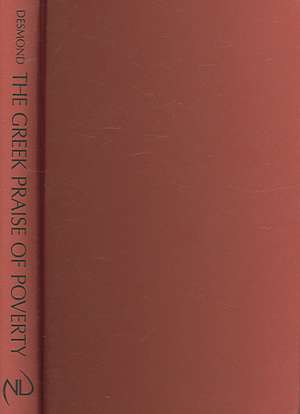The Greek Praise of Poverty
Autor William D. Desmonden Limba Engleză Hardback – 30 ian 2006
"Rich in new and stimulating ideas, and based on the breadth of reading and depth of knowledge which its wide-ranging subject matter requires, The Greek Praise of Poverty argues impressively and cogently for a relocation of Cynic philosophy into the mainstream of Greek ideas on material prosperity, work, happiness, and power." —A. Thomas Cole, Professor Emeritus of Classics, Yale University
"This clear, well-written book offers scholars and students an accessible account of the philosophy of Cynicism, particularly with regard to the Cynics' attachment to a life of poverty and their disdain for wealth. I have truly profited from reading William Desmond’s book." —Luis Navia, New York Institute of Technology
William Desmond, taking issue with typical assessments of the ancient Cynics, contends that figures such as Antisthenes and Diogenes were not cultural outcasts or marginal voices in the classical culture of the fifth and fourth centuries B.C. Rather, the Cynic movement had deep and significant roots in what Desmond calls "the Greek praise of poverty." Desmond demonstrates that classical attitudes toward wealth were complex and ambivalent, and allowed for an implicit praise of poverty and the virtues it could inspire.
From an economic and political point of view, the poor majority at Athens and elsewhere were natural democrats who distrusted great concentrations of wealth as potentially oligarchical or tyrannical. Hence, the poor could be praised in contemporary literature for their industry, honesty, frugality, and temperance. The rich, on the other hand, were often criticized as idle, unjust, arrogant, and profligate. These perspectives were reinforced by typical Greek experiences of war, and the belief that poverty fostered the virtues of courage and endurance. Finally, from an early date, Greek philosophers associated wisdom with the transcendence of sense experience and of such worldly values as wealth and honor. The Cynics, Desmond asserts, assimilated all of these ideas in creating their distinctive and radical brand of asceticism. Theirs was a startling and paradoxical outlook, but it had broad appeal and would persist to exert a manifold influence in the Hellenistic period and beyond.
Preț: 589.40 lei
Preț vechi: 765.45 lei
-23% Nou
Puncte Express: 884
Preț estimativ în valută:
112.79€ • 120.60$ • 94.04£
112.79€ • 120.60$ • 94.04£
Carte tipărită la comandă
Livrare economică 18 aprilie-02 mai
Preluare comenzi: 021 569.72.76
Specificații
ISBN-13: 9780268025816
ISBN-10: 0268025819
Pagini: 256
Dimensiuni: 157 x 235 x 18 mm
Greutate: 0.53 kg
Ediția:1
Editura: University of Notre Dame Press
ISBN-10: 0268025819
Pagini: 256
Dimensiuni: 157 x 235 x 18 mm
Greutate: 0.53 kg
Ediția:1
Editura: University of Notre Dame Press
Recenzii
"According to Desmond, democratic populism, Greek heroism, and a philosophic yearning for absolute truth--forerunners of Cynic asceticism--all derive from the virtue of frugality. . . . Philological and philosophical, Desmond draws widely from the original Greek sources and argues persuasively for his provocative conclusions." —Choice
"The ancient Cynics have long been seen as exceptional and outside the margins of Greek culture. William Desmond makes a powerful argument against this perception, by searching for the origins of Cynic ideas and attitudes within mainstream Greek culture and society. He examines a wide number of different texts, ranging from Homer to Hesiod to the tragic poets, Thucydides, Herodotus, Xenophon and of course Plato and Aristotle. . . This is a very successful and interesting book that deserves to be read by a wide audience." —Bryn Mawr Classical Review
“In his thought-provoking The Greek Praise of Poverty: Origins of Ancient Cynicism, William D. Desmond proposes that the chief reason for this widespread appeal and longevity is that, for all its flamboyance, Cynicism in fact had deep roots in traditional Greek culture, and in particular in Greek suspicions of wealth, and praise of frugality and the simple life . . . erudite, scholarly and mostly well-written.” —Times Literary Supplement, March 23, 2007
Notă biografică
William Desmond is a lecturer in the Department of Classics at Trinity College, Dublin.
